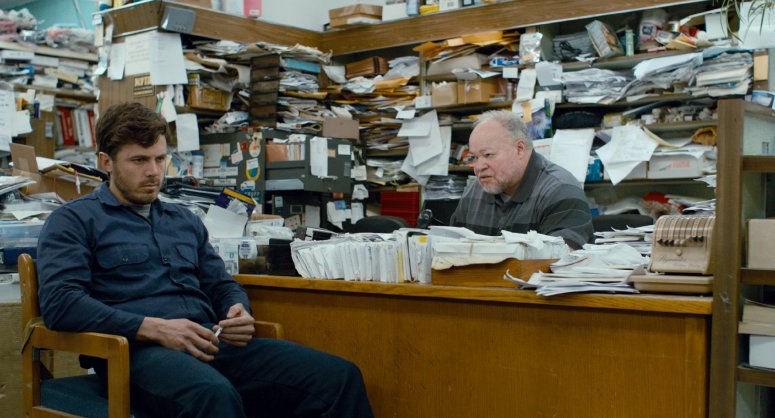Kenneth Lonergan‘s Manchester by the Sea is yet another Oscar nominee that I knew basically nothing about. I knew that Casey Affleck was in it thanks to his nomination for best lead actor. However, I also knew something about the controversy about him, not sure what it was, though, so I had that prejudice against him. I also knew that two actors I had not really heard of(Lucas Hedges and Michelle Williams) had been nominated for best supporting actors. This lead me to guess that it would be a very performance-driven film, this was especially helped by the fact that is was nominated for best original screenplay. I assumed from the poster that the story would be personal and small, similar to Fences (Review). I had not seen any trailers, I was almost totally unaffected by this film’s marketing department. I did a spot of research just before seeing the film and saw that director Kenneth Lonergan was also the writer for this film and had spent most of his career as a writer. That’s just some information I went in with so that I was still a blank slate just a blank slate with a tiny mark in the corner. With almost no information, thus no expectations, I jumped into the film.

I am pretty sure, in total, I liked this film but the fact that I am hesitant about it makes me think that it isn’t that great a film. I really did think it was charming, Lonergan has really found a style and the performances were really amazing. However, its repetitive nature made me lose interest towards the end of the second hour of the film. Let me first talk about the content because it was important to the overall feel of the film. It was about an emotionless man, Lee, who’s brother dies and leaves him in charge of his teenage son. We watch both Lee and his nephew tackle loss and grief in their own ways. This subject matter may seem ‘done’, however, the style that Lonergan uses made the story real and unique. The crafting of Lee’s character was really well done and often we learnt more about him and that information explains more about why he is so emotionless. By the way, I really liked how Casey Affleck played Lee, mostly where he put his eyes during a scene. The placement of his eyes told us his emotions, whether he was nervous, intense or melancholy. Of course, it wasn’t just this that made his performance great. It was also Affleck‘s ability to hold back tears believably. This aspect of the film, coupled with the filmmaking made an entertaining watch. The first shot, where a distant angle showed a boat where Casey Affleck‘s Lee talked with his young nephew, Patrick, visually shows how we do not know much about the characters at this point – we are watching at this point. However, contrasted to the last shot of the film, we see the two characters on the boat again (only now Ben O’Brien has been replaced by Lucas Hedges), but this time we are on the boat with the characters. We have learned and become part of their family. This clever, alive camera is used throughout the film to tell the audience how they should be feeling. For example, we are often in the car with the two men but at the beginning, we are watching from the side window of the car, whereas later on, we are sat in the backseat when they are arguing – it becomes much more personal. This is definitely clever and it makes me feel clever for picking up on the nuance. The film was definitely helped along by the writing, it was realistic and the information structure kept me engaged in a ‘done’ plot much longer than most people would have thought. Through omitting Lee’s backstory, I stayed engaged to find out.

I was very much enjoying the LOST-esque flashbacks in this movie. By that, I mean that memories would be triggered by something. For example, when the lawyer informed Lee that his brother has put Patrick in Lee’s custody, it triggers a memory as to why he shouldn’t be in custody of Patrick. By making these connections, Lonergan makes Lee’s train of thought very clear to the audience and is a good technique that most other filmmakers could learn from. The real kicker flashback, the one I mentioned before about why Lee can’t take custody, was extremely powerful, again, through the use of information. We do not know what the fate of Lee’s children was, I personally assumed that they were just with her mother, and because we did not know – there is a suspense when watching a seemingly harmless flashback. Lonergan also puts beats in this sequence by making the present-tense lawyer say his name. This is to show it is in real time but also add intensity to the flashback as it makes it clear that it is intense and emotional for out mostly emotionless protagonist. Speaking of the emotion that our ‘hero’ shows, it increases in intervals with more volume each time. Specifically talking about sad emotions, we first see him express them when seeing his dead brother, not when he hears he is in the hospital and not even when he is told that he is dead. This is to establish that Lee is cold and probably resistant to death, however, they make him cry to show the connection he had with his brother, or else the audience may assume that he just didn’t like him(and assumed that the flashbacks up until that point have withheld a betrayal). The next time I remember seeing emotion from the present day Lee (not in flashback) is when he was talking to his ex-wife, Randi(Michelle Williams). In this scene, Lee’s wife is trying to apologise to him for what she said and he holds back tears valiantly as he denies her apologies. It was a powerful moment that leads to a great emotional climax that did not rely on cutaways.

The aspects of the films I didn’t like came when after we, the audience, had learned everything we needed to. I learned what had happened to Lee’s children, which was an extremely powerful couple of scenes, climaxing when Lee went to kill himself in the police station. However, after then, I found that I didn’t really care about the outcome of the story as much. I realised that I didn’t truly care where Lee or Patrick lived, I just wanted answers for why Lee was the way he was: aggressive to tenants and picking bar fights. This was explained in an elegant way, but the film drags on for another half an hour telling us about how Patrick is doing with his girlfriend and reestablishing that Lee is bad around people: refuses to make small talk. However, both of these were already well established and, for me at least, didn’t add to the story at all. These slip ups take away from my overall view of the film, I think. Despite this, I have little else in the way of complaints, though. I liked the cold colours of the film, it worked well in contrast of the visual climax of the film(the fire), I also liked all of the performances and the content. With the biggest and probably only complaint of the film is that it drags at the end, that isn’t that bad for the third directing attempt(after Margaret and You Can Count on Me) especially with six Oscar nominations!

Overall, it was a definite good film and I liked so much of it. However, I can’t call it a great film because of the quarter of the film I could barely pay attention to. I think that all of the actors nominated at the Oscars, especially Casey Affleck for his performance. This was the first thing I saw him act in and he absolutely blew me away. As always, I always could be making mistakes or could have missed something important that would change my mind because I only saw the film once before watching this. This film has taught me about how to balance how much information the audience has. It has taught me about how to keep an audience engaged through the omission. If this film had shown less information or made Lee less interesting then I would not have cared about the information they were withholding. I would recommend this film to most people that like a good family drama and who are prepared to deal with a heavy plot.
